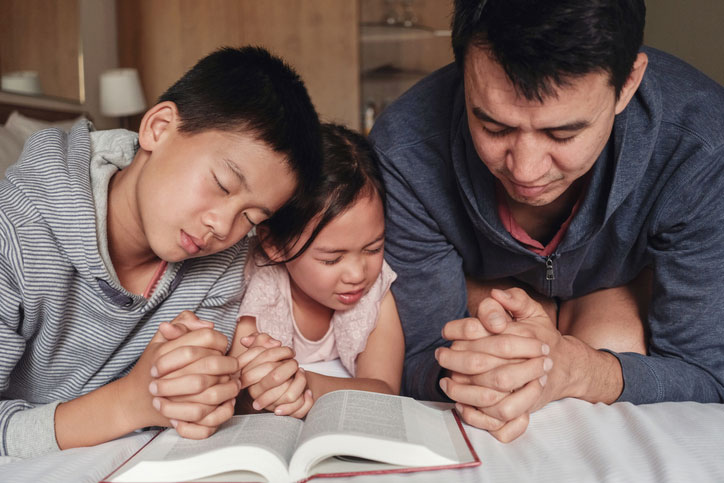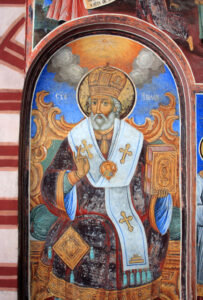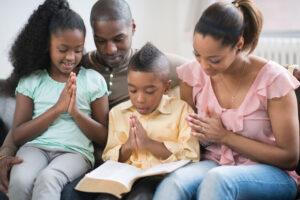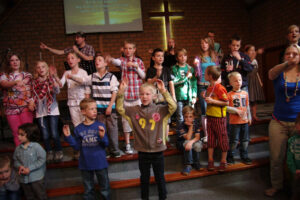
Day one in your children’s ministry experience: you will feel as though you have stepped into the pages of Lord of the Flies.
Someone will be crying. Something will be broken. Someone will definitely have put something, possibly glue, into someone else’s hair. You will look around and ask yourself what God could possibly have been thinking to create such creatures.
But the Lord knew exactly what he was doing. And before long, so will you.
Explore a Christian Ministry Degree – Request More Info Today!
You’ll feel the rapt attention as you read Bible stories that also captivated you as a child. You’ll see the curiosity and hear the questions as you talk about Heaven and the importance of right and wrong and obeying thy father. And you will feel the warmth of their souls as you witness the spirit taking hold within each of them.
Then Jesus called for the children and said to the disciples, “Let the children come to me. Don’t stop them! For the Kingdom of God belongs to those who are like these children. I tell you the truth, anyone who doesn’t receive the Kingdom of God like a child will never enter it.
~ Luke 18:16-17
Kids are the key to the kingdom of heaven. And a children’s pastor is the shepherd along the path.
What Is Children’s Ministry?
Anyone who works in children’s ministry has a pretty clear idea what it’s all about. From the outside looking in, though, it can seem a bit mysterious.
That’s because kids are a challenging group to pastor to.
- Dwindling attention spans
- Challenges in describing religious concepts
- Difficulties in relating motivations and faith
At its core, though, children’s ministry is about connecting innocents with Jesus and his love. And that’s the same reason it may be the most rewarding ministry for those who can master it.
Jolly Old Saint Nick Takes His Name Saint Nicholas of Myra, Patron Saint of Children.
 The connections are obvious when you think about them, but many people don’t until it’s pointed out: Jolly Old Saint Nick, our modern icon of Christmas, takes his name from an actual saint—Saint Nicholas of Myra, patron saint of children.
The connections are obvious when you think about them, but many people don’t until it’s pointed out: Jolly Old Saint Nick, our modern icon of Christmas, takes his name from an actual saint—Saint Nicholas of Myra, patron saint of children.
Nicholas was a Greek Christian bishop who is believed to have lived from 270 to 343 AD. He came by his patronage of children through a miracle that sounds gruesome to modern ears: he was said to have rescued three children being pickled by a butcher, and resurrecting them.
This holy service eventually was recognized around Christmas, where European Christians began to give their children gifts in his name. The Dutch term for him, Sinterklaas, was eventually migrated back into English as Santa Claus.
But Nick’s role as patron saint and protector of children may be a more important one for children’s pastors to remember.
Many in the church look at children’s ministry as a caretaking role. They just want to drop the kid’s off during Sunday services so they aren’t scribbling in the hymnals and interrupting the pastor.
But what happens during that time is actually a critical part of their spiritual development. Children’s ministry provides the instruction and helps answer the questions that we all must have answered as we develop into thinking, feeling, spiritual beings.
The children’s ministry may be the most shepherd-like of any, both in terms of caring for and protecting your congregation. It’s a weighty responsibility. But God would not have called you to it if you didn’t have the capabilities you need.
The Job Description of a Children’s Pastor
If you look up actual job descriptions for children’s pastors, you will find a lot of dry lines listing duties such as:
- Nurture discipleship through worship, service, and education
- Oversee Sunday school, church nursery, and supervise children
- Develop connections with families
- Coordinate season music plans with children’s choir director
- Plan and execute children’s ministry programming
They make it sound like any other by-the-book office job. But it’s really anything but.
You can fill in the blanks for the actual job description of children’s pastors by flipping around all those challenges up above and saying, “Solving them.”
It’s a tall order, but there are formulas you learn for getting it done.
Education is the First Order of Business for Children’s Ministry Jobs
Everything else you do as a kid’s pastor revolves around this most important thing: preparing them for lives as spiritual beings and faithful Christians.
Direct your children onto the right path, and when they are older, they will not leave it.
~ Proverbs 22:6
That means teaching:
- Teaching the verses and lessons of the Bible
- Demonstrating character and moral living
- Instructing them in obedience and fidelity
None of that is as easy as just reading out of a book, although you’ll do a lot of that, too.
More than any other kind of ministry, you have to meet kid’s where they are at to get their attention. Whether that’s the latest Peppa Pig cartoon or an obsession with the Avengers, children’s pastors have to adapt the message of the Gospels to relatable stories for kids.
Creativity and adaptability are essential. But so is a strong and deep knowledge of Scripture. The better you understand God’s message, the easier it will be to tease it out in whatever teaching opportunity arises in your Sunday School group or pastoral lesson.
Should You Consider a Family and Youth Ministry Degree?
 Except in the worst possible circumstances, it's not possible or desirable to separate the spiritual formation of children from the larger context of their families. So you will find quite a few degrees available in this field that acknowledge the point by calling themselves family and youth ministry degrees.
Except in the worst possible circumstances, it's not possible or desirable to separate the spiritual formation of children from the larger context of their families. So you will find quite a few degrees available in this field that acknowledge the point by calling themselves family and youth ministry degrees.
In practical terms, you might not find a lot of differences between family and youth ministry degrees and any other sort of children's ministry program. Many of the courses will deal with the same subjects, and in most cases you will get the same combination of general pastoral training and specialized youth ministry courses either way.
The reason to select a family and youth ministry degree might be more for the perspective than the class content. By incorporating the realities of addressing kid's spiritual needs together with their home environment and upbringing, you might be better equipped to handle common challenges in the children's ministry that revolve around family. Situations such as one parent being supportive of a religious upbringing while the other is not, or where tension at home disrupts spiritual learning are not uncommon.
A family and youth ministry degree will teach you to look at your congregants as a family unit, and to provide for all their needs and work in harmony with those rather than treating children as separate and fully formed.
Children's Ministry Requires Making Partners of Parents
Although you will be working with kids day in and day out, no one knows a child like their parents. And no one has as much influence, either. So your first task has to be getting parents on board.
This is a train the trainer part of the job.
You will meet directly with parents and help them understand the lessons you are presenting their kids, and provide them with the tools and materials they need to support those lessons.
In other words, children's ministry is almost always also family ministry.
This can also include recruiting and training volunteers to help out in your ministry. You can never have too many hands for running games at the church picnic. It's the children's pastor's job to wrangle those extra hands when needed and make sure they get the job done
Children's Pastors Follow as Well as Lead
 Children's ministry is important, but it's almost always a few steps down the church hierarchy wherever you work. That means coordinating and taking direction from senior pastors and other church leaders.
Children's ministry is important, but it's almost always a few steps down the church hierarchy wherever you work. That means coordinating and taking direction from senior pastors and other church leaders.
This is the part of the job that's most like regular office work. You'll go to meetings, staff phone trees, file reports, fill out forms. You'll make connections with other pastors and work as part of a team for the good of the entire congregation.
But you'll also be mentored and find your own opportunities for spiritual growth as a key part of a larger organization.
Children's Ministry Means Being There for Kids
Your most important task as children's pastor is also the least well-defined. You can't possibly know all the ways or the different kinds of concerns that kids will bring to you during the course of your duties. But one thing is for sure: you need to be a trusted, caring counselor when those things come up.
Adults can understand when you ask them to make an appointment later in the week if they have a concern. With kids, you have to deliver for them in the moment.
You won't find this on any formal job description for children's ministry. But without it, you won't get any of the other tasks done.
How To Become a Children's Pastor
 Like other ministry roles, the path to becoming a children's pastor is going to be unique for everyone called to it. For some, you may know as soon as you are shown God's plan for you; others, it will only be revealed in time, through experience and prayer.
Like other ministry roles, the path to becoming a children's pastor is going to be unique for everyone called to it. For some, you may know as soon as you are shown God's plan for you; others, it will only be revealed in time, through experience and prayer.
If you're like most people who go into kid's ministry, it probably starts out with volunteering or taking on a part-time job in that role at your own church. Maybe as a teenager you worked as a church camp counselor and found you had a knack for relating to the kids. Maybe you ended up teaching Sunday School one day when the regular teacher was out and thought it was kind of fun.
Once you get that taste, other volunteer or entry-level paths to children's ministry aren't hard to find. It can be one of the most difficult ministries for many churches to staff. And there are many faith-based and non-profit organizations that work with kids who are looking for staff.
But just being willing only gets you so far. At some point, professional children's pastors will need some kind of formal education. That means a college degree.
The Educational Path to Children's Ministry
Once you do know you are called to pastor to kids, you owe it to them and to Jesus to become qualified to do the best job you can with it.
It's actually pretty common for children's ministry jobs to be junior or entry level positions at many churches. But whether or not you or the church view it as a steppingstone, that does mean you can get into the role with relatively lower qualifications than some other pastoral jobs.
Associate Degrees in Children’s Ministry Open the Door
Associate programs specializing in children's ministry aren't common. You are more likely to find them in youth ministry, or youth and family ministry.
An associate degree is the absolute ground-level of college studies you can pursue in this area, however. It's a two-year program that will cover both general studies and specific children's ministry skills such as:
- Developmental psychology
- Practical skills in children's ministry
- Scriptural studies
It’s a way to get your feet wet as a children’s pastor when you may not have the time or money to pursue a higher degree.
Most Children’s Ministry Jobs Require Bachelor’s Degrees
In most cases, getting a professional position in this field means earning at least a bachelor’s degree in ministry. You might major in children’s ministry or pick a degree in pastoral studies with a concentration in children’s ministry. If you picked up an associate first, you might even be able to count that toward your first two years of bachelor’s studies.
But at the bachelor’s level, you’ll have to master more advanced skills such as:
- Children's Spiritual Formation
- Preaching to kids
- Children's counseling
- Lesson planning and religious curriculum development
- Cross-cultural education
And you get more basic training common to all pastoral studies, such as Biblical exegesis, theology, and communication skills.
Many of these four-year degrees also involve practicum or internship placements, which give you hands-on experience under the watchful eye of instructors.
Master’s Degrees Lead To Senior Roles in Children’s Ministry
You will also find master's-level degrees offered in children's ministry. It's rare for people to jump right into these. Instead, you'll probably pick up some experience working in the field with a four-year degree under your belt first. At some point, you may find your calling requires even more knowledge, a deeper dedication to the ministry.
That’s what a master’s degree in children’s ministry will get you. This is the kind of education that senior pastors have. You might need that kind of qualifications to be a leader in children's ministry in a very large church, or a children's ministry director in a faith-based non-profit. But even if you work in smaller parishes, the knowledge and practical skills will be useful.
A master's degree offers useful knowledge in skills in this most challenging of ministry fields.
Master's studies are usually highly customizable, allowing you to focus your coursework and research in a specific area that interests you. You can also turn these degrees into career opportunities in curriculum development for children's ministry, or training other children's pastors as a professor yourself.
Finding Your Calling in Children's Ministry
No matter what level of education you achieve in the course of your career, you'll have to remember it's just a tool in God's toolbox to make you a better shepherd of the young. More important will be the personal qualities and experience you build over the years:
- Discipline
- Reputation
- Inspiration
- Devotion
Ultimately, however you develop them, those will be the kinds of qualifications you need to be a success in children’s ministry.
There May Be No Children’s Pastor More Effective or More Well-Known than Fred McFeely Rogers
 Mister Rogers didn't fit the conventional role of a children's pastor. Then again, he didn't fit the conventional role for anything. As a television host and broadcaster, he took the least likely path to children's programming, and found an iconic place in the childhood history of millions with Mister Rogers' Neighborhood.
Mister Rogers didn't fit the conventional role of a children's pastor. Then again, he didn't fit the conventional role for anything. As a television host and broadcaster, he took the least likely path to children's programming, and found an iconic place in the childhood history of millions with Mister Rogers' Neighborhood.
The show ran from 1968 until 2000. But Rogers began laying the groundwork for his unique relationship to America’s children with a bachelor’s degree in divinity (forerunner to today’s standard Master of Divinity degrees) from Pittsburgh Theological Seminary in 1962. He was ordained as a Presbyterian minister in 1963.
Religion was never a central theme in Mister Rogers' Neighborhood, but it was an undercurrent to all of the messages of morality, decency, and kindness. The connection Rogers enjoyed with children was both magical and inspiring for children's ministers everywhere. And despite being awarded more than 40 honorary degrees, a lifetime achievement Emmy award, and the Presidential Medal of Freedom, Rogers himself would tell you it was that connection that was his greatest reward.
Something that children’s pastors enjoy and appreciate more than anything else is joy. There’s a thrill available every day when you work with kids, the purest kind of happiness and excitement that emerges from eyes seeing the wonders of God’s creation for the first time, from souls feeling that first blessing of Jesus’ love.
That’s not something you find in any other kind of ministry, and it makes all the difference for children’s pastors who are in it for the long haul.








